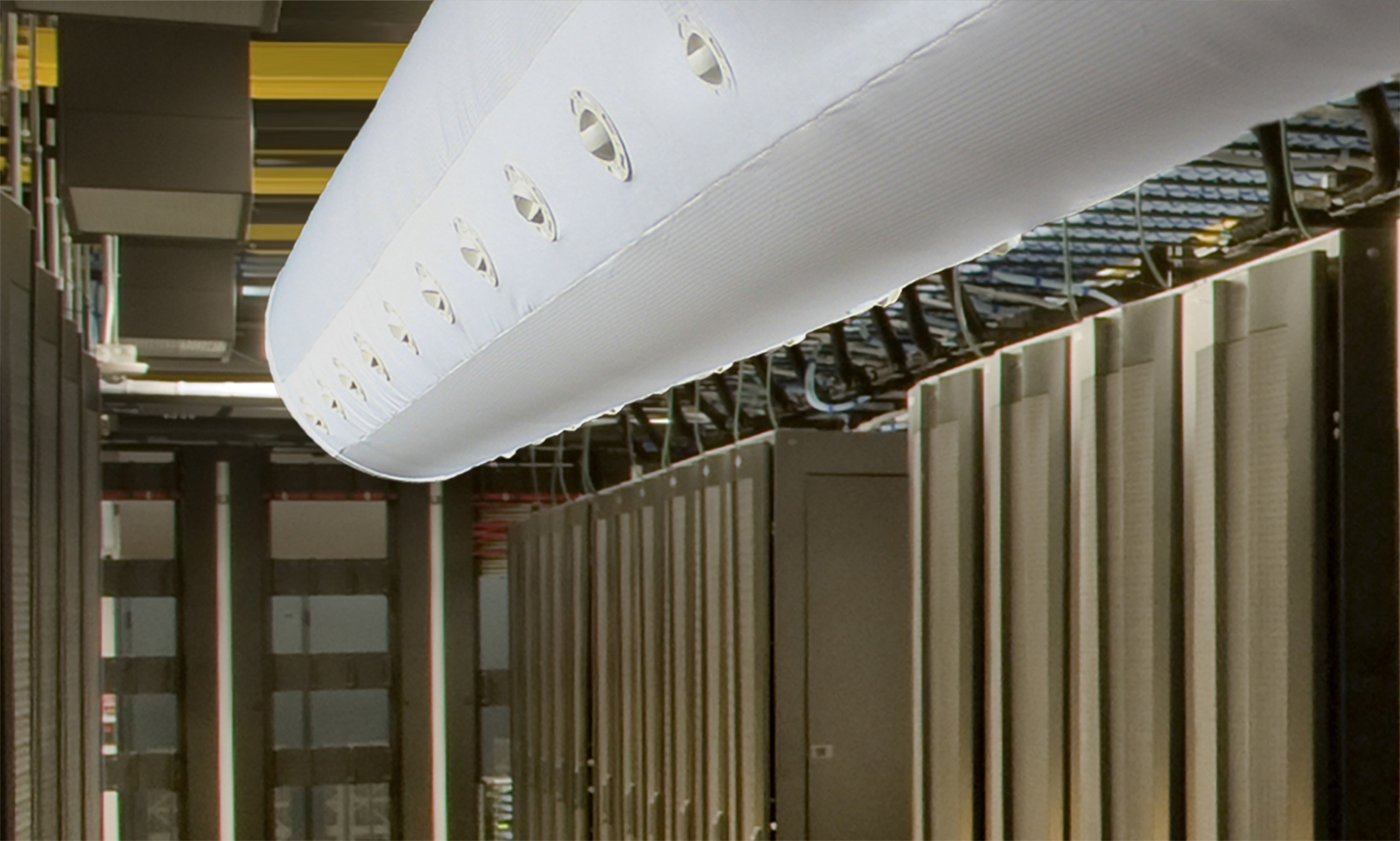by Brianna Crandall — March 6, 2017 — Peosta, Iowa-based DuctSox, a fabric HVAC air-dispersion systems manufacturer, recently introduced DataSox, which the company says is the heating, ventilation and air-conditioning (HVAC) industry’s first customizable air displacement ventilation ductwork system with on-site directional adjustability for effectively and energy-efficiently cooling commercial data center equipment.
DataSox is a round, overhead and porous fabric HVAC duct system that distributes a large volume of air down into data center cold aisles, but with low 400-FPM velocities engineered not to upset critical equipment intake and exhaust or room-return air-containment balances. It also offers the flexibility of directional spot-cooling capabilities with adjustable nozzles for high-wattage servers. The nozzles allow for on-site testing and air balancing for optimum performance not previously available to the data center industry.

Customizable fabric DataSox air-dispersion duct offers effective, energy-efficient cooling advantage vs. overhead and under-floor metal ductwork.
DataSox outperforms conventional air-dispersion methods with its factory-engineered, energy-efficient 1/4 to 1/2-inch w.g. of static pressure and results in cold aisle temperatures 3°F to 5°F lower than traditional distribution, but with up to 40 percent less computer room air-conditioning (CRAC) flow rates, especially when complemented with variable frequency drive (VFD) equipment. Using DataSox helps data centers achieve lower power usage effectiveness (PUE) levels, which makes it a perfect sustainability product for green construction projects, says the company.
DataSox is a custom-engineered product constructed of the following multiple air-dispersion technologies:
- Stat-X — White permeable specialty fabric has built-in anti-static qualities from its electrostatic dissipative (ESD) yarn that is specifically designed for electric-sensitive environments such as data centers. It also disperses a small 2.5-CFM/sq. ft. of airflow, which makes up about one percent of the DataSox’s total porosity;
- Custom porosity fabric — occupies the bottom third of the round duct to evenly disperse a large volume of air downward toward equipment rack facades, but without drafts. The white micro-perforated fabric delivers up to 400-CFM/sq. ft. of airflow at 1/2-inch of static pressure. Originally designed to distribute air in commercial kitchens and laboratories with velocities that do not disrupt fume hood exhaust, this material reduces cleaning maintenance versus conventional fabric porosities;
- Adjustable nozzles — strategically positioned in rows along the duct’s length at the optimum angles. The 360-degree rotatable hemispherical diffusers secured inside a two-inch-diameter (33-CFM, 1/2-inch w.g.) or three-inch-diameter (83-CFM, 1/2-inch w.g.) grommet are designed to snap into the laser-cut orifices. The matching white hemispheres can rotate into 10 different notched airflow angle settings including up, down, right or left, as well as completely open or closed. The nozzles also have an anti-condensation design to eliminate concerns of moisture formation on the material.
More traditional data center air-dispersion methods, such as overhead metal duct/register systems or under-floor air-chase plenums fall short of DataSox in overall efficacy and PUE, says the company. Large air velocities common among overhead metal duct/register systems typically cause turbulence and return air containment disruptions, resulting in equipment heat build-ups in underserved parts of the rack. Under-floor chases are either too crowded with communication and electrical cabling or cannot efficiently force upward the increased volume of air required for higher capacity servers.
Other DataSox features are:
- Standard diameters ranging from 14 to 48 inches, with custom sizing available;
- Positioning over the cold aisle at cabinet-level heights for easy access to nozzles;
- Proven results from a third-party test laboratory, along with five documented corporate and cloud beta test sites;
- Air-dispersion methodology that separates supply and return air without the use of containment curtains or barriers;
- One- and two-row suspension system options dependent on duct diameter offer a clean, aesthetic appearance;
- Ability to reach equipment from all commonly used data center ceiling heights;
- Potential of operating CRACs at lower, more efficient temperatures because fabric has a lower dew point temperature than metal;
- Tempered air comfort without drafts for employees and other IT personnel;
- Five-year warranty; and
- UL-2518 and NFPA-90 compliance for fire and smoke regulations.
For more information visit the DataSox product page.





